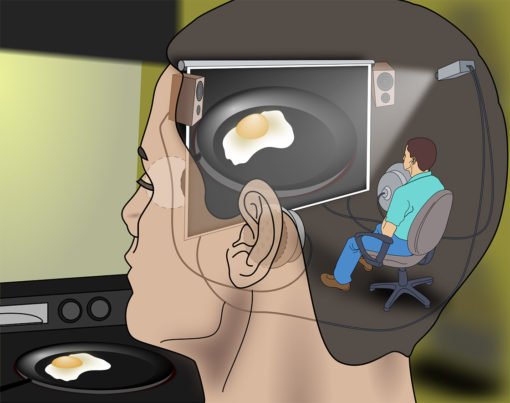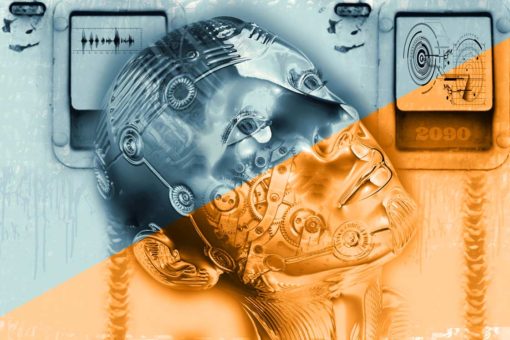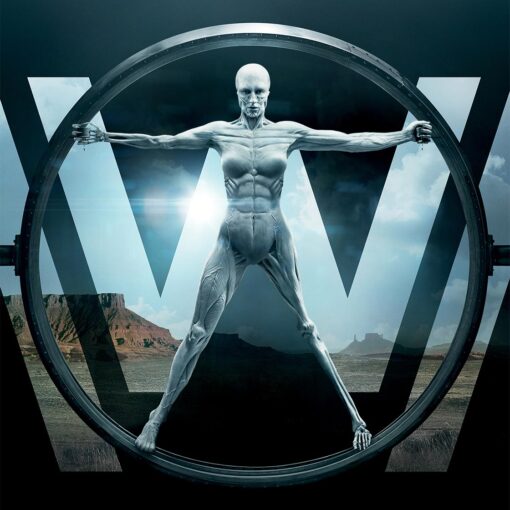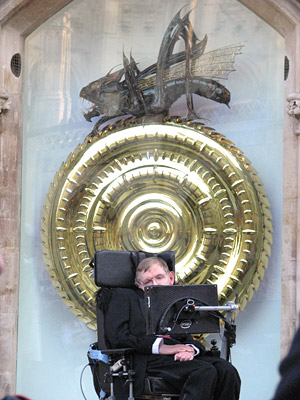Software programmer and technical writer Peter Kassan avers that a return to dualism is not justified. This article appeared in Skeptic magazine 22.4 (2017). About the image below: An illustration of the Cartesian theater. A tiny person sits in a movie theater inside a human head, watching and hearing everything that is being experienced by […]
Tags
-
browse by topic
artificial intelligence
eSkeptic for July 9, 2018
Now Playing at a Cartesian Theater Near You: Dualism Returns

Software programmer and technical writer Peter Kassan avers that a return to dualism is not justified. This article appeared in Skeptic magazine 22.4 (2017).
Why We Should Be Concerned About Artificial Superintelligence

Matthew Graves warns that the same general problem-solving ability that makes artificial superintelligence a uniquely valuable ally may make it a uniquely risky adversary.
eSkeptic for November 8, 2017

It’s possible that artificially intelligent systems might end up far more intelligent than any human. In this week’s eSkeptic, Matthew Graves warns that the same general problem-solving ability that makes artificial superintelligence a uniquely valuable ally may make it a uniquely risky adversary.
eSkeptic for March 8, 2017
In this week’s eSkeptic, Michael Shermer discusses the question of whether artificial intelligence poses an existential threat to human beings; MonsterTalk interviews Guy Lyon Playfair about The Enfield Poltergeist; and Bill Nye Saves the World on Netflix and in the latest issue of Skeptic magazine 22.1!
eSkeptic for January 11, 2017
Stephen Beckner reviews season one of HBO’s most-watched TV series Westworld, and considers some of the concepts presented in the first ten episodes: creation, evolution, artificial intelligence, memory, consciousness, self-awareness, free will, and suffering. WARNING: This review contains spoiler alerts.
Out of the Loop, Lost in the Maze: The Stealth Determinism of Westworld

Stephen Beckner reviews season one of HBO’s most-watched TV series Westworld, and considers some of the concepts presented in the first ten episodes: creation, evolution, artificial intelligence, memory, consciousness, self-awareness, free will, and suffering. WARNING: This review contains spoilers from season one, and speculation about future events.
Dr. Andrew Hodges discusses Alan Turing: The Enigma, the book that inspired the film The Imitation Game starring Benedict Cumberbatch
It is only a slight exaggeration to say that the British mathematician Alan Turing (1912–1954) saved the Allies from the Nazis, invented the computer and artificial intelligence, and anticipated gay liberation by decades — all before his suicide at age 41. In November a major motion picture starring Benedict Cumberbatch as Turing will be released, based on the classic biography by Dr. Andrew Hodges, who teaches mathematics at Wadham College, University of Oxford (he is also an active contributor to…
Beware the Dystopian Visions of Celebrity Scientists

Mike McRae considers artificial intelligence, and critiques physicist Stephen Hawking’s opinions on the topic as “expert creep”—the phenomenon of scientists celebrated within one discipline choosing to make public statements on matters outside of their field of experience.
A.I. Gone Awry: The Futile Quest for Artificial Intelligence

For decades now computer scientists and futurists have been telling us that computers will achieve human-level artificial intelligence soon. That day appears to be off in the distant future. Why? In this penetrating skeptical critique of AI, computer scientist Peter Kassan reviews the numerous reasons why this problem is harder than anyone anticipated.
Beyond Human: Living with Robots & Cyborgs
Concepts once purely fiction — robots, cyborg parts, artificial intelligence — are becoming part of everyday reality. Soon robots will be everywhere, performing surgery, exploring hazardous places, making rescues, fighting fires, and handling heavy goods. After a decade or two, they will be as unremarkable as computer screens are now in our offices, airports, and restaurants…
06-08-25
In this week’s eSkeptic, in this penetrating skeptical critique of Artificial Intelligence, computer scientist Peter Kassan reviews the numerous reasons why this problem is harder than anyone anticipated.
SKEPTIC App
Whether at home or on the go, the SKEPTIC App is the easiest way to read your favorite articles. Within the app, users can purchase the current issue and back issues. Download the app today and get a 30-day free trial subscription.










